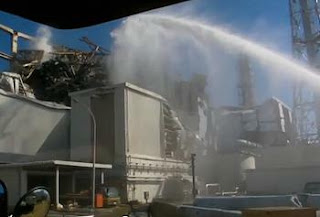 |
| Fukushima Reactor #3 |
{14.08.13}US Person has been posting regularly on the nuclear disaster at Fukushima {09.07.13} but the source was unknown. The contamination is described by TEPCo as "highly concentrated tritium". Japanese Prime Minister Abe has belatedly decided to get his government involved in stopping the emissions since the corporate owner has proved to be unable to cope with the ramifications of the world's largest industrial accident. Abe described the problem as "urgent". He got that right but apparently little else. Fukushima Prefecture is getting help from the UN's International Atomic Energy Agency (IAEA). Agency experts visited the prefecture in July to implementation of a three year plan to handle low-level nuclear wastes, decontamination and environmental remediation. Commercial fishing has not restarted despite acceptable levels of radioactivity in fish due to consumer doubts about the safety of the catch.
that has entered a slow-leak-out-of-mind phase after that the danger of an outright explosion releasing fallout into the atmosphere is well past. Corporate mass media has already forgotten about the disaster. But the damage the crippled power station is doing to the biosphere continues almost unabated, making one wonder just exactly the "so sorry" Japanese authorities are doing about stoping the radioactive emissions. Radioactive groundwater is escaping from the station in huge amounts. An official estimate is 300 tons of radioactive groundwater may be flowing into the Pacific Ocean each day. Earlier this year high levels of radioactivity were detected in the ocean near the plant indicating a leak or leaks,
While Abe promised funding for halting the radioactive leaks, Green Action, the Japanese environmental group, said the funding was too little, too late since it will not be budgeted until next fiscal year, and more importantly the source of the leaks has not been tracked down to their source. The group said if leaking is caused by pipes or other equipment damaged by the earthquake and not the following tsunami as the government believes, the determination would have profound implications for all of Japan's nuclear facilities currently shut down during a reassessment of the industry. Perhaps the Japanese government is loath to avoid discovering such earthquake damage until after nuclear facilities are restarted. All of Japan nuclear facilities are near active faults. Fukushima Daiichi was once one of the largest 15 nuclear power stations in the world with six BWRs producing 4.7GW of power. Nature, like Gojira rising from the sea [photo], destroyed it. The expensive process of decommissioning it is now underway.
Nuclear power development in the United States has been brought to a temporary halt by judicial mandate after a
 |
| attempting to cool overheating fuel at Fukushima |
